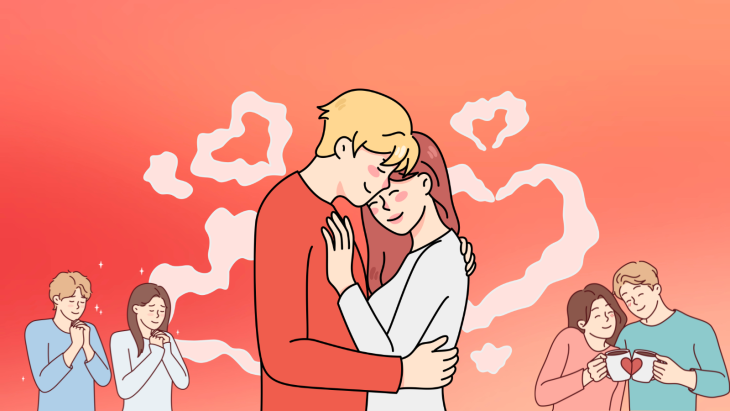Categories
Recent Posts
Popular
Recent Posts
- I broke up with my partner, but now I am having doubts. Did I do it out of the right reasons or was I just being fearful?
- My Quick Temper Pushes People Away. What Do I Do To Manage My Anger?
- How does noise affect my mental health?
- I want to be a better problem solver. What is a step by step approach?
- Escapism. When is it healthy? When is it damaging?
Most Popular
The Science Of Love: How Hormones Affect Your Relationship?

Love is a beautiful and complicated emotion that has interested writers, artists, and scientists for
centuries. Even though it may feel like magic, those fluttering feelings in your chest are caused by a lot
of science. Our hormones have a significant impact on the way love works. So, let's take a trip through
the exciting world of love and hormones to find out how our emotional relationships work.
The Pleasure Seeker
Ever wonder why being in love gives you a rush of happiness? That's the effect of dopamine! This
chemical causes these intense feelings of pleasure and reward. When you're with the person you love,
your brain releases dopamine, making you happy and excited. Addiction is caused by the same chemical,
which might explain why love can be addicting.
Bonding Hormone
Oxytocin sometimes called the "cuddle hormone" or the "love hormone," is crucial to making and
keeping bonds between people. Oxytocin helps build trust and closeness by being released in large
amounts when people hug, kiss, or cuddle. It's also essential during childbirth and nursing because it
helps mothers bond with their babies. So, the next time you hug someone you care about, thank
oxytocin for making your bond stronger.
Mood Stabilizer
Serotonin is a hormone that helps control how we feel and how we feel about things. Serotonin levels
can change a lot when you're in love. This roller coaster ride can lead to the highs and lows of being in a
relationship, like feeling happy and then worried. It's like having a natural mood balancer that keeps
your emotional connection on a thrilling edge.
A Sign of Stress
Love is only sometimes a walk in the park. Stress can be caused by relationship problems, which is when
cortisol, the "stress hormone," comes into play. Cortisol levels can increase when you fight with your
partner or have issues in your relationship. Too much cortisol isn't good, but a typical amount can help
you adjust to the ups and downs of love and deal with it.
Natural Painkillers
Have you ever heard the saying, "Love is pain"? Well, it turns out that it's true. When you get dumped or
go through a breakup, your brain makes endorphins, which are natural painkillers. These hormones help
ease the mental pain of a broken heart and give you time to heal.
What Makes People Attractive
Hormones like testosterone (more common in men) and estrogen (more common in women) play a
significant role in sexual interest and desire. These hormones are a big part of what makes us want to be
sexual, and they also cause the first sparks of sexual love that often bring people together. These factors
continue to affect sexual pleasure and desire as a relationship gets more robust.
Even if you know how hormones affect love, it doesn't detract from loving relationships' magic. Instead,
it adds a layer of science mystery to how we feel. Love combines chemicals and hormones that make us
think and act amazingly.
So, the next time you're head over heels in love or trying to figure out how to handle a complicated
relationship, remember that it's not just your heart that's doing the work; it's also your hormones.
Accept the science of love, and let it help you understand the incredible journey of human relationships
even better. Love is a beautiful mix of energy and feelings, and it's something to celebrate every day.
centuries. Even though it may feel like magic, those fluttering feelings in your chest are caused by a lot
of science. Our hormones have a significant impact on the way love works. So, let's take a trip through
the exciting world of love and hormones to find out how our emotional relationships work.
The Pleasure Seeker
Ever wonder why being in love gives you a rush of happiness? That's the effect of dopamine! This
chemical causes these intense feelings of pleasure and reward. When you're with the person you love,
your brain releases dopamine, making you happy and excited. Addiction is caused by the same chemical,
which might explain why love can be addicting.
Bonding Hormone
Oxytocin sometimes called the "cuddle hormone" or the "love hormone," is crucial to making and
keeping bonds between people. Oxytocin helps build trust and closeness by being released in large
amounts when people hug, kiss, or cuddle. It's also essential during childbirth and nursing because it
helps mothers bond with their babies. So, the next time you hug someone you care about, thank
oxytocin for making your bond stronger.
Mood Stabilizer
Serotonin is a hormone that helps control how we feel and how we feel about things. Serotonin levels
can change a lot when you're in love. This roller coaster ride can lead to the highs and lows of being in a
relationship, like feeling happy and then worried. It's like having a natural mood balancer that keeps
your emotional connection on a thrilling edge.
A Sign of Stress
Love is only sometimes a walk in the park. Stress can be caused by relationship problems, which is when
cortisol, the "stress hormone," comes into play. Cortisol levels can increase when you fight with your
partner or have issues in your relationship. Too much cortisol isn't good, but a typical amount can help
you adjust to the ups and downs of love and deal with it.
Natural Painkillers
Have you ever heard the saying, "Love is pain"? Well, it turns out that it's true. When you get dumped or
go through a breakup, your brain makes endorphins, which are natural painkillers. These hormones help
ease the mental pain of a broken heart and give you time to heal.
What Makes People Attractive
Hormones like testosterone (more common in men) and estrogen (more common in women) play a
significant role in sexual interest and desire. These hormones are a big part of what makes us want to be
sexual, and they also cause the first sparks of sexual love that often bring people together. These factors
continue to affect sexual pleasure and desire as a relationship gets more robust.
Even if you know how hormones affect love, it doesn't detract from loving relationships' magic. Instead,
it adds a layer of science mystery to how we feel. Love combines chemicals and hormones that make us
think and act amazingly.
So, the next time you're head over heels in love or trying to figure out how to handle a complicated
relationship, remember that it's not just your heart that's doing the work; it's also your hormones.
Accept the science of love, and let it help you understand the incredible journey of human relationships
even better. Love is a beautiful mix of energy and feelings, and it's something to celebrate every day.








Comments